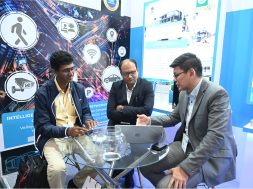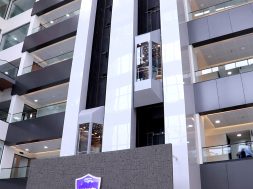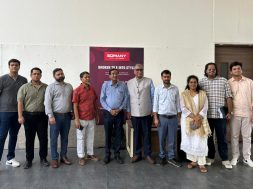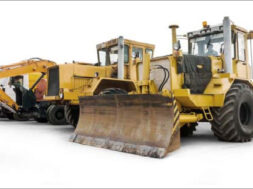TMT is at the heart and soul of construction. It is the backbone of whole structure. More attention is required while buying the TMT bars as once they are used they become irreplaceable. Little more consciousness, a penny more invested for the sake of quality can lead to enhanced life and safety of your dream house
Infrastructure development is the backbone of nation’s growth. A major contribution to India’s infrastructure has come from growth in the construction of residential/commercial buildings and high rise. In the demand for making such buildings safer, builders as well as individuals are focusing more on the quality of material used. Steel is the key raw material used in India’s predominantly RCC construction. It is therefore imperative that steel used for construction must be of top quality and should be produced with most modern and state of the art technology to fulfil the infrastructural needs of our burgeoning population.
Reinforced concrete construction (RCC) is the dominant construction method adopted in India owing to advantage of economy in designs, corrosion resistance and fire proofing properties. Reinforced concrete structure comprises of bonding steel and concrete together to withstand induced forces. The properties of thermal expansion for both steel and concrete are approximately the same; this along with excellent bendability and bonding property of steel makes it the most preferred material for reinforcement in concrete structures.
Thermo mechanically treated rebars (TMT rebars) impart strength and ductility to RCC structure to withstand various kinds of loads impacting a building. These days a lot of focus is given in designing structures that have high earthquake resistance. TMT bars have high fatigue resistance to Seismic loads due to its higher UTS/YS ratio. This makes them most suitable for use in earthquake prone areas. Usage of TMT has enabled economy in design, construction of high risers with improved earthquake resistance along with added advantage of superior weldability, corrosion resistance, ductility and durability.
Thermo-mechanically treatment of reinforced bars involves a combination of plastic deformation of steel in austenitic stage followed by quenching and further tempering. The automated process controls at each critical operation ensure uniform properties in each rebar and provide the TMT bars strong and tough tempered layer imparting it with high ductility as well as strength and anti-corrosive properties. TMT bars are free of torsional stresses thus having superior corrosion resistance. Controlled water-cooling prevents the formation of coarse carbides which is the main cause for corrosion.
In India, steel demand is approximately 75 mn tonnes. Out of this around 23 mn tonnes is for TMT Bars alone making it single largest consumed steel product. However when we examine the supply side, the demand of 23 mn tonnes is roughly met by 7 mn tonnes from primary steel producers and remaining 16mn tonnes from secondary steel producers. SAIL, Jindal Steel and Power Ltd (JSPL), JSW, Tata Steel, RINL are the primary steel producers in the country producing steel using virgin iron ore. The extensive metallurgical process of producing steel followed by rolling the clean steel in modern rolling mills leads to production of superior quality steel with uniform and consistent properties. On the other hand, the secondary steel producers follow a less modern and sometimes questionable set of processes and technologies making the reinforced bars susceptible to sub standard quality. Unfortunately, many house builders and common folks are not aware of difference between the two kinds of producers and are also not clear on quality parameters that one ought to look for while buying TMT bars which are viewed more as a commodity product.
The difference between product quality of primary and secondary steel producers is mainly on two counts. One is the raw material used and second is the rolling process adopted. Primary steel producers process virgin iron ore through extensive metallurgical operations followed by refining technologies that make steel clean and free from inclusion and harmful tramp elements such as sulphur and phosphorous. Secondary steel producers on the other hand primarily use steel scrap as their core input and convert it into TMT rebars. Further the scrap used is mostly non-homogeneous, non- segregated and of inferior grade having high level of tramp elements. The chemical composition of re-bars thus produced is inconsistent leading to non uniform physical properties which hampers the strength, ductility and elongation of steel. Secondly, the automated rolling process and control on heat treatment procedures adopted by primary steel producer enables them to produce ultra high strength TMT rebars with lean and precise chemistry free from harmful impurities. TMT rebars so produced have tight and controlled size tolerance, better rib pattern to ensure bonding with concrete, higher UTS/YS ratio and less carbon equivalent to impart superior weldability. Whereas the rolling mills found in the secondary steel producer category are not so automated and in some cases downright antiquated and lacking in various critical processes such as heat treatment which leads to non uniform product properties potentially putting the construction in harm’s way.
Jindal Steel and Power Limited (JSPL) is one of India’s major and primary steel producers with a significant presence in sectors like mining, power generation and infrastructure. JSPL has set up a state-of-the-art steel rolling plant in Jharkhand. The TMT rebars produced here are technically advanced and are vastly superior from the rest owing to a combination of ultra clean steel that is rolled in world’s most advanced Morgan Mill deploying Siemens state-of-the-art HYQST technology for thermo mechanical treatment. The quality standards of rebars produced in this mill surpass the requirements of Bureau of Indian Standards (BIS).
In order to make world-class TMT available to individual house builder, JSPL has taken an unusual step of foraying into retail with the launch of Jindal Panther TMT Rebars. This consumer facing brand has been created to decommoditise rebars as a product and to create consumer awareness through highly differentiated communication aimed primarily at imparting product knowledge. The objective is to enable end consumer to take an informed decision while purchasing TMT rebars.
Panther is not only a premium and advanced quality product but also a brand that is rewriting the commercial rules of the game through initiatives such as:• Well branded dealer shops uniquely identifiable through JSPL’s Retail Identity Program• Material sold on per piece basis to avoid wastage and any ambiguity that may occur in case of weighing• Well defined, transparent and fixed monthly prices• Free home delivery• Material quality backed with test certificates.
JSPL have end to end manufacturing process control on TMT Rebars. It makes TMT from superior quality iron ore and high quality imported coal from Australia. These raw materials go through extensive metallurgical process of cleaning, refining, casting and rolling. According to JSPL, some of the primary steel producers are partially producing through what is known as “Conversion Route” wherein the raw material (billet) is given to small re-rolling units which convert it into TMT. This shift of control from primary steel producers to secondary mills dilutes the quality of the end product.
Individual home builders are not aware about the quality parameters of TMT. As a national brand which is rapidly attaining leadership position in the TMT product category, JSPL stands committed to offer world-class product as well as spreading awareness so that the consumers are enlightened on the subject and are able to take an informed decision on their choice of TMT rebars.
JSPL lists out some points that a buyer must take note before purchasing rebars:• Should buy TMT rebars of primary steel producers• Ascertain quality parameters in line with requirement of BIS 1786• Ask for mill test certificate • Should buy on per piece basis to avoid wastage.
53
Cookie Consent
We use cookies to personalize your experience. By continuing to visit this website you agree to our Terms & Conditions, Privacy Policy and Cookie Policy.









